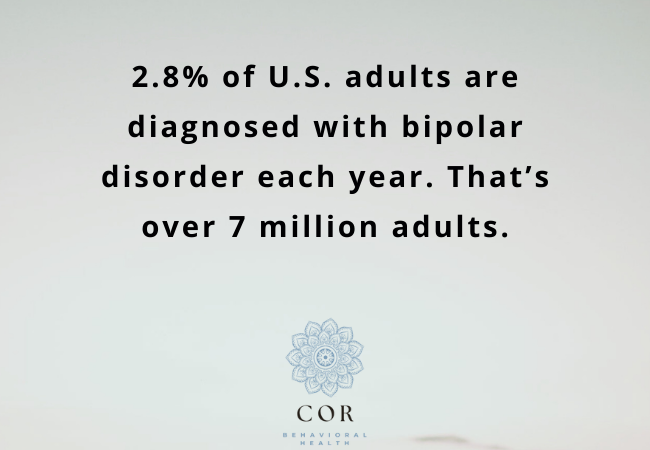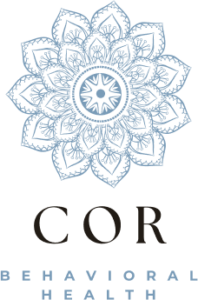
Bipolar disorder is often misunderstood. It’s more than mood swings or “being emotional.” It’s a serious mental health condition marked by significant shifts in mood, energy, activity levels, and the ability to carry out day-to-day tasks. For individuals living with bipolar disorder—and for those who care about them—understanding the signs, debunking common myths, and finding effective treatment is crucial for long-term wellness.
At COR Behavioral Health, we provide expert-led bipolar treatment in Martin County, Florida, along with integrated care for depression, anxiety, trauma, and co-occurring conditions. Whether you’re newly diagnosed or supporting a loved one, this guide will help clarify the truth about bipolar disorder and how it can be managed with compassion and clinical care.
What Is Bipolar Disorder?
Bipolar disorder, formerly known as manic-depressive illness, is a mental health condition characterized by intense mood changes—from emotional highs (mania or hypomania) to deep lows (depression).
There are several types of bipolar disorder:
1. Bipolar I Disorder
- Defined by at least one manic episode that may be preceded or followed by depressive episodes.
- Mania can lead to hospitalization or psychosis in severe cases.
2. Bipolar II Disorder
- Involves recurring episodes of depression and hypomania (a milder form of mania).
- Often misdiagnosed as depression due to the absence of full manic episodes.
3. Cyclothymic Disorder
- Chronic mood instability with periods of hypomanic symptoms and depressive symptoms that don’t meet full criteria for bipolar I or II.
These conditions can cause significant disruptions in daily life, relationships, work, and overall health if left untreated.
Recognizing the Signs of Bipolar Disorder
Mania or Hypomania Symptoms
- Inflated self-esteem or grandiosity
- Decreased need for sleep
- Rapid speech or racing thoughts
- Unusual distractibility
- Risky behavior (spending sprees, substance use, impulsive decisions)
- Increased goal-directed activity or agitation
Depressive Episode Symptoms
- Persistent sadness or hopelessness
- Loss of interest in activities
- Fatigue or slowed movements
- Difficulty concentrating
- Changes in sleep or appetite
- Suicidal thoughts or feelings of worthlessness
Episodes can last days, weeks, or even longer. People with bipolar disorder can experience periods of normal mood between episodes, which often adds to the confusion for those around them.
Common Misconceptions About Bipolar Disorder
Misinformation and stigma often prevent individuals from seeking help. Let’s clear up a few major myths:
Myth 1: Bipolar Disorder Is Just Mood Swings
Fact: Everyone experiences ups and downs, but bipolar mood changes are far more intense, longer-lasting, and disruptive.
Myth 2: People with Bipolar Disorder Can’t Function Normally
Fact: With proper treatment, many people with bipolar disorder lead full, successful lives in careers, relationships, and communities.
Myth 3: Bipolar Disorder Is Rare
Fact: It affects 2.8% of U.S. adults annually. That’s over 7 million people—more than the population of Massachusetts.
Myth 4: Medication Alone Is Enough
Fact: While medication is essential, comprehensive care often includes therapy, lifestyle support, and structured programs.
At COR Behavioral Health, we take a whole-person approach to mental health treatments in Martin County, Florida, ensuring all aspects of the disorder are addressed.
Diagnosing Bipolar Disorder
A proper diagnosis is critical—and often delayed. Many individuals are misdiagnosed with depression alone or treated for anxiety disorders without recognizing underlying bipolar patterns.
Diagnosis Typically Involves:
- Comprehensive psychiatric evaluation
- Personal and family mental health history
- Review of mood episodes and their impact
- Ruling out other conditions (e.g., thyroid issues, substance use)
If you suspect you or a loved one may have bipolar disorder, early assessment through our Addiction and Mental Health Treatment Center in Martin County, Florida can change the trajectory of your recovery.
Effective Treatment Options for Bipolar Disorder
Bipolar disorder is chronic, but highly manageable with the right support system and treatment plan.
1. Medication Management
Mood stabilizers, antipsychotic medications, and, in some cases, antidepressants are used to manage episodes and prevent relapse. Our team offers safe, monitored medication support as part of your comprehensive care plan.
2. Individual Therapy
At COR Behavioral Health, individual therapy in Martin County, Florida helps you:
- Build emotional awareness
- Understand your triggers
- Improve stress management
- Strengthen relationships
- Cope with past trauma or current life stressors
Therapies such as CBT, DBT, and psychoeducation are highly effective in bipolar treatment.
3. Group Therapy
Group therapy in Martin County, Florida allows individuals with bipolar disorder to connect with peers, gain insights, and develop interpersonal skills. Group support reduces isolation and provides a platform for shared learning.
4. Structured Programs: PHP and IOP
Sometimes, more intensive care is needed—especially after a crisis, hospitalization, or when symptoms become unmanageable.
Partial Hospitalization Program in Martin County, Florida (PHP)
- Daily treatment with psychiatric oversight
- Includes therapy, medication support, education, and skills-building
- Allows clients to return home each evening
Intensive Outpatient Program in Martin County, Florida (IOP)
- A flexible, structured program offering 3–5 days of support per week
- Ideal for clients transitioning from inpatient care or those needing more than weekly sessions
Both programs provide a bridge to stability without full inpatient admission.

Living with Bipolar Disorder: What Recovery Looks Like
Recovery doesn’t mean the disorder goes away—it means you learn to manage it, minimize its impact, and build a fulfilling life. With time and treatment, many clients:
- Recognize early warning signs
- Create healthy daily routines
- Stay medication compliant
- Strengthen support systems
- Improve work and family life
- Reduce or eliminate hospitalizations
Whether you’re navigating your first diagnosis or seeking better tools to manage symptoms, help is available—and recovery is possible.
Addressing Co-Occurring Conditions
Bipolar disorder often exists alongside other mental health concerns. At COR Behavioral Health, we provide integrated treatment for:
- Anxiety – Our anxiety treatment in Martin County, Florida addresses panic, worry, and co-triggering symptoms.
- Depression – Even during stable phases, depression treatment in Martin County, Florida helps reduce lingering low moods.
- Trauma – Many clients also benefit from our trauma treatment in Martin County, Florida, particularly if past experiences affect mood stability.
- Substance Use – Dual diagnosis care is provided through our Addiction and Mental Health Treatment Center in Martin County, Florida.
Why Choose COR Behavioral Health for Bipolar Treatment?
When you’re managing bipolar disorder, you need a team that sees the whole you—not just the diagnosis. At COR Behavioral Health, we offer:
- Compassionate, skilled clinicians with deep expertise in mood disorders
- Customized treatment plans that evolve with you over time
- Full continuum of care from individual therapy to outpatient programming
- Dual diagnosis care for co-occurring addiction or trauma
- Community-based support in the heart of Martin County
We believe in empowering you to live fully and confidently, not just managing symptoms—but thriving beyond them.
Conclusion
Living with bipolar disorder can feel isolating, confusing, and exhausting. But you’re not alone—and with the right treatment, stability and fulfillment are absolutely within reach.
Whether you need help making sense of your mood swings, want support navigating a new diagnosis, or are looking for a provider who truly understands what you’re going through, COR Behavioral Health is here for you. Call us today at 888.231.7973 to learn more about our bipolar treatment in Martin County, Florida, and begin your journey toward clarity, balance, and healing.
Frequently Asked Questions (FAQs)
What are the first signs of bipolar disorder?
Early signs include drastic mood changes, reduced need for sleep, impulsive behavior, prolonged sadness or irritability, and changes in energy or focus. A professional evaluation is recommended for an accurate diagnosis.
How is bipolar disorder different from depression?
While both involve depressive episodes, bipolar disorder also includes periods of elevated mood (mania or hypomania), which are not present in clinical depression.
Can bipolar disorder be cured?
There is no cure, but with proper treatment—including therapy, medication, and structured support—bipolar disorder can be effectively managed, and individuals can live stable, fulfilling lives.
What kind of therapy works best for bipolar disorder?
Cognitive Behavioral Therapy (CBT), psychoeducation, and Dialectical Behavior Therapy (DBT) are commonly used in individual therapy in Martin County, Florida to help clients manage mood changes, stress, and daily functioning.
What support programs do you offer for bipolar disorder?
COR Behavioral Health provides Partial Hospitalization Programs (PHP) and Intensive Outpatient Programs (IOP), offering comprehensive care through therapy, medication support, and life skills training.
Do you treat bipolar disorder alongside addiction or trauma?
Yes. As an Addiction and Mental Health Treatment Center in Martin County, Florida, we specialize in dual diagnosis care, treating co-occurring disorders such as anxiety, trauma, and substance use.



